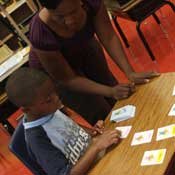Early childhood education, the creative economy and interracial cooperation are crucial to Mississippi's economic development, state business leaders say.
The Mississippi Economic Council, Momentum Mississippi and the Mississippi Partnership for Economic Development released their Blueprint Mississippi 2011 recommendations earlier this month.
Blake Wilson, president of the council, encouraged early childhood teachers to stay committed to their students at the Mississippi Early Childhood Association's annual conference Oct. 14. "Mississippi is a state of limited resources, folks," Wilson said. "We have to be faster, smarter, cheaper and better, and we have to celebrate small victories, even if the total victory isn't won every year that we try to win it."
Wilson told the Jackson Free Press that education comes up consistently when he talks to business leaders, and 4th-grade testing scores are critical in determining whether children will succeed in the rest of school and enter the work force able to compete. Unfortunately, many young children--especially those living in poverty--do not get the educational development they need at home to prepare for kindergarten.
"The issue is that in today's world, the family network in many, many families has disintegrated," he said. "So, we have to have a different system to make sure children are being read to and given the basic skills that I received from my family."
Laurie Smith, executive director of Mississippi Building Blocks and vice president for public policy at the Mississippi Early Childhood Association, said Wilson helps business leaders understand the role early childhood education plays in the future work force.
"Sometimes people think about early childhood as babysitting," she said. "He sees it as an economic-development issue in that what we invest today is what we will have in our state later on."
Smith said that for now, with budgets for K-12 education already strained, improving existing child-care centers is more cost-effective than adding an extra grade in every elementary school. "Down the road, when our state starts to reap the benefit of that earlier investment, I think pre-K will naturally be the next step," she said.
Wilson agrees that funding is a hurdle for early childhood education proponents.
The Mississippi Economic Council supports Mississippi Building Blocks, a program that helps improve existing child-care centers. While it's a far cry from making pre-kindergarten available to every child under the age of 5 in the state, Wilson said improving existing child-care providers is a cost-effective way to give more children a better chance at success.
Blueprint Mississippi also recommends supporting the state's "creative economy" as defined in a recent report by the Mississippi Arts Commission and the Mississippi Development Authority.
The Blueprint recommendations suggest promoting entrepreneurship and small business growth among small creative firms, helping communities preserve their cultural heritage, using more art in business marketing and developing strategies to grow the state's tourism industry.
The creative economy is made up of anyone who is involved in a creative enterprise, including chefs, designers, performing artists and writers. It also includes people who might not normally be associated with the arts, such as the people who make stoves or print books, and do creative jobs in non-creative industries, such as the person who designs logos for a factory. The study found that Mississippi's creative economy provides jobs for about 60,000 Mississippians, making up about 3 percent of the state's total economy.
Blueprint Mississippi also recommends promoting diversity in the work force and in management throughout the state, and investing in local projects to promote interracial cooperation. The recommendations place a special emphasis on youth programs to "ensure future generations of leadership are mindful of diverse perspectives."
The committees that worked on Blueprint Mississippi released their recommendations before the full report to focus attention on their priorities ahead of the elections.
Blueprint Mississippi will release its full report in January. Read more of the initial recommendations at blueprintmississippi.com.



Comments
Use the comment form below to begin a discussion about this content.
comments powered by Disqus